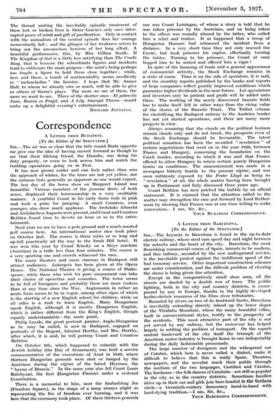Correspondence
A LETTER FROM BUDAPEST. IT° the Editor of the SPECTATOR.] SIB,—The air was so clear that the hills round Buda opposite me give one the idea of having moved forward as though to see that their lifelong friend, the Danube, was doing his duty properly, or even to look across him and watch the building operations going on in Pest.
It has now grown colder and one feels rather than sees the approach of winter, for the trees are not yet yellow, nor the autumn tints generally as apparent as one would expect. The last day of the horse show on Margaret Island was beautiful. Various members of the jeunesse doree, of both sexes, displayed their horsemanship in a very creditable manner. A youthful Count in his early teens rode in pink and took a prize for jumping. A small Countess, even younger, also drew much applause. The Archduke Albrecht and Archduchess Augusta were present, and Count and Countess Bethlen found time to devote an hour or so to the enter- tainment.
Next year we are to have a polo ground and a much-wanted golf course here. An international motor race took place on October 2nd. The course is three miles or so long and up-hill practically all the way to the Swab Hill hotel. It was won this year by Count Kinsky on a Steyr machine (Austrian) in a trifle less than four minutes. The course is a. very sporting one and crowds witnessed the race.
The many theatres and more cinemas in Budapest still
attract audiences. Lohengrin has been given at the Opera House. The National Theatre is giving a course of Shake- speare, while those who wish for pure amusement can take their choice of operettas and comedies. The town- seems to be full of foreigners and probably there are more visitors than at any time since the War. Anglomania in rather an acute form seems to be in vogue, among other signs of which is the starting of a new English school for children, while on all - sides is a rush to learn English. Many Hungarians speak English, although it is mostly Hungarian English, which is rather different from the King's English, though equally understandable—the main point.
Philip Laszlo, the great portrait painter, Anglo-Hungarian as he may be called, is now in Budapest, engaged on portraits of the Regent, Admiral Horthy, and Mrs. Horthy, after which, it is said, he will portray Count and Countess Bethlen.
On October 6th, which happened to coincide with the
Jewish holiday (the Day of Atonement), was held a service commemorative of the executions of Arad in 1849, where thirteen Hungarian generals were shot or hanged by the Austrians during the regime of the hated Heyman, the " hyena of Brescia." In the same year also fell. Count Louis Batchyani, the first Hungarian Premier under a restored Constitution.
There is a memorial to him, near the Szabadshag Jer (Freedom Square), in the shape of a lamp always alight as representing the fire of freedom ever burning, and it was here that the ceremony took place. Of these thirteen generals one was Count Leiningen, of whom a story is told that he was taken prisoner by the Austrians, and on being taken to the officer was roundly abused by the latter, who called him a rebel and traitor. It so happened that a troop of Hungarian Hussars had witnessed the incident from a distance. In a very short time they not only rescued the Count, but took prisoner his captor, effectually turning the tables. Turning to his prisoner, the Count at once begged him to be seated and offered 'him a cigar ! In spite of the booming of trade and a general appearance of commercial activity, the Stock Exchange remains in a state of coma. Time is on the side of operators, it is said, and the monthly reports published by the banks and reports of large companies reflect greatly improved conditions which guarantee higher dividends in the near future. Let speculators and investors only be patient and profit will be added unto them. The working of the newly discovered bauxite fields has to snake itself felt in other ways than the rising value of the shares of the Bauxite Trust. The Talbot scheme for electrifying the Budapest railway to the Austrian border has not yet started operations, and there are many more projects in view.
Always assuming that the clouds on the political horizon remain clouds only and do not break, the prospects even of the Stock Exchange should be favourable. The latest political sensation has been the so-called " revelation " of certain negotiations that went on in the year 1920, between France and Hungary, concerning the boundaries on the Czech border, according to which it was said that France offered to allow Hungary to retain certain purely Hungarian towns on conditions. The announcement was made in a newspaper bitterly hostile to the present regime, and was soon ruthlessly exposed by the Pester Lloyd as being no " revelation " at all, the whole matter having been brought up in Parliament and fully discussed three years ago.
Count Bethlen has now pricked the bubble by an official statement. It is claimed that the attention called to the matter may strengthen the ease put forward by Lord Rother- mere by showing that France was at one time willing to make concessions.—I am, Sir, &c.,
YOUR BUDAPEST CORRESPONDENT.


















































 Previous page
Previous page